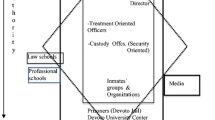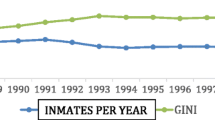Abstract
This chapter explores the evolution and variety of social order and governance arrangements in prisons in the Dominican Republic. The Dominican Republic provides a unique case study for prison research: it is a non-Western, high-crime, and low-resource context, but has made a major investment in reforming prisons to align with international human rights standards. Half of its prisons are “new” and reformed—with new buildings, staff, and programs—and half remain in the “old” conditions, with deteriorated infrastructure and police/military authority. In the “old” prisons, governance arrangements have shifted over the past decade, from a “provó” system where individual powerful prisoners ran facilities with near-total control, to a form of negotiated authority in which both prisoner “representatives” and prison staff share power. In contrast, in the new prisons, the new corrections professionals have dismantled any form of prisoner-led governance and have imposed formal authority on all aspects of daily life. These contrasting governance arrangements stem from material and social circumstances and from deliberate policy decisions by government officials. In each setting, prisoners expressed appreciation for certain aspects of daily life under a given regime, and express frustration with other aspects. Based on surveys and interviews with prisoners and interviews with staff and other actors, this chapter describes the history, key components, and mechanisms of the current governance arrangements in old and new prisons. It also explores the reasons for prisoners’ mixed perceptions. I argue that the Dominican examples show the need to integrate key insights from the principal theoretical frameworks of prison governance. Specifically, the Dominican case illustrates the salience of blending two frameworks: Skarbek’s emphasis on the provision of material goods and safety and of Pérez Guadalupe & Nuñovero’s emphasis on the nature of dialogue between prisoners and formal authorities.
Access this chapter
Tax calculation will be finalised at checkout
Purchases are for personal use only
Similar content being viewed by others
Notes
- 1.
This chapter draws on and contains excerpts from my doctoral dissertation, From Rulay to Rules: Perceptions of Prison Life and Reforms in the Dominican Republic’s Old and New Prisons (Peirce, 2021).
- 2.
For example, the UN Mandela Rules cap stays at 15 days and prohibit this for certain vulnerable groups.
References
Antillano, A. (2015). Cuando los presos mandan: Control informal dentro de la cárcel venezolana. Espacio Abierto, 24(4), 16–39.
Biondi, K. (2017). Sharing this walk: An ethnography of prison life in Brazil (Trans. by John F. Collins). University of North Carolina Press.
Birkbeck, C. (2011). Imprisonment and internment: Comparing penal institutions North and South. Punishment & Society, 13(3), 307–332. https://doi.org/10.1177/1462474511404320
Blevins, K. R., Listwan, S., Cullen, F. T., & Lero Jonson, C. (2010). A general strain theory of prison violence and misconduct: An integrated model of inmate behavior. Journal of Contemporary Criminal Justice, 26(2), 148–166. https://doi.org/10.1177/1043986209359369
Butler, M., Slade, G., & Dias, C. N. (2018). Self-governing prisons: Prison gangs in an international perspective. Trends in Organized Crime, 1–16,. https://doi.org/10.1007/s12117-018-9338-7
Carranza, E. (2012). Situación penitenciaria en América Latina y el Caribe ¿Qué hacer? Anuario de Derechos Humanos, 8, 31–66. https://doi.org/10.5354/adh.v0i8.20551
CDN, R. (2021, June 29). Jean Alain encabeza lista de 18 imputados en Operación Medusa. https://cdn.com.do/principales/jean-alain-rodriguez-encabeza-lista-de-18-imputados-en-operacion-medusa/
Cheliotis, L. K. (2006). How iron is the iron cage of new penology? The role of human agency in the implementation of criminal justice policy. Punishment & Society, 8(3), 313–340. https://doi.org/10.1177/1462474506064700
Coyle, A. (2003). A human rights approach to prison management. Criminal Behaviour and Mental Health: CBMH, 13(2), 77–80.
Craig, S. C. (2004). Rehabilitation versus control: An organizational theory of prison management. The Prison Journal, 84(4 suppl), 92S-114S. https://doi.org/10.1177/0032885504269394
Crewe, B. (2011). Soft power in prison: Implications for staff–prisoner relationships, liberty and legitimacy. European Journal of Criminology, 8(6), 455–468. https://doi.org/10.1177/1477370811413805
Darke, S. (2018). Conviviality and survival—Co-producing Brazilian prison order. Palgrave Macmillan.
DiIulio, J. J. (1987). Governing prisons: A comparative study of correctional management. Free Press.
Goodman, P., Page, J., & Phelps, M. (2015). The long struggle: An agonistic perspective on penal development. Theoretical Criminology, 19(3), 315–335. https://doi.org/10.1177/1362480614547151
Gundur, R. V. (2018). The changing social organization of prison protection markets: When prisoners choose to organize horizontally rather than vertically. Trends in Organized Crime, 1–19, https://doi.org/10.1007/s12117-018-9332-0
Hartling, D., & Modesto, H. (2020). Estado actual de la ejecución penal y el sistema penitenciario de la República Dominicana. In M.-C. Fuchs & L. González Postigo (Eds.), Ejecución penal y Sistema Penitenciario en América Latina (pp. 328–352). Centro de Estudios de Justicia de las Americas (CEJA) & Konrad Adenauer Stiftung.
Jackson, J., Tyler, T. R., Bradford, B., Taylor, D., & Shiner, M. (2010). Legitimacy and procedural justice in prisons. Prison Service Journal, 191, 4–10.
Jefferson, A. M. (2007). Prison officer training and practice in Nigeria: Contention, contradiction and re-imagining reform strategies. Punishment & Society, 9(3), 253–269. https://doi.org/10.1177/1462474507077494
Justice Trends. (2017). Dominican republic: An example of penitentiary reform to follow. Innovative Prison Services. http://www.justice-trends.press/interviews--entrevistas.html
Lerman, A. E. (2013). The modern prison paradox. Cambridge University Press.
Lessing, B. (2015). Counterproductive punishment: How prison gangs undermine state authority (SSRN Scholarly Paper ID 2644812). Social Science Research Network. https://papers.ssrn.com/abstract=2644812
Lessing, B. (2016). Inside out: The challenge of prison-based criminal organizations (No. 3; Reconstituting Local Orders Working Papers). The Brookings Institute. https://www.brookings.edu/research/inside-out-the-challenge-of-prison-based-criminal-organizations/
Liebling, A. (2004). Prisons and Their Moral Performance: A Study of Values, Quality, and Prison Life. Oxford University Press.
Liebling, A., & Arnold, H. (2012). Social relationships between prisoners in a maximum-security prison: Violence, faith, and the declining nature of trust. Journal of Criminal Justice, 40(5), 413–424. https://doi.org/10.1016/j.jcrimjus.2012.06.003
Lindegaard, M. R., & Gear, S. (2014). Violence makes safe in South African prisons: Prison gangs, violent acts, and victimization among inmates. Focaal, 2014(68), 35–54. https://doi.org/10.3167/fcl.2014.680103
Listin, D. (2021, July 14). Operación Medusa: Trasladan a Jean Alain y grupo a Najayo. Listin Diario. https://listindiario.com/la-republica/2021/07/14/679312/operacion-medusa-trasladan-a-jean-alain-y-grupo-a-najayo
Macaulay, F. (2013). Modes of prison administration, control and governmentality in Latin America: Adoption, adaptation and hybridity. Conflict, Security & Development, 13(4), 361–392. https://doi.org/10.1080/14678802.2013.834114
Martin, T. M. (2017). Scrutinizing the embrace of human rights in Ugandan prisons: An ethnographic analysis of the equivocal responses to human rights watch reporting. Journal of Human Rights Practice. https://doi.org/10.1093/jhuman/hux014
McCorkle, R. C., Miethe, T. D., & Drass, K. A. (1995). The roots of prison violence: A test of the deprivation, management, and “not-so-total” institution models. Crime & Delinquency, 41(3), 317–331. https://doi.org/10.1177/0011128795041003003
Narag, R. E., & Jones, C. R. (2017). Understanding prison management in the Philippines: A case for shared governance. The Prison Journal, 97(1), 3–26. https://doi.org/10.1177/0032885516679366
Nunes Dias, C., & Darke, S. (2016). From dispersed to monopolized violence: Expansion and consolidation of the Primeiro Comando da Capital’s Hegemony in São Paulo’s prisons. Crime, Law and Social Change, 65(3), 213–225. https://doi.org/10.1007/s10611-015-9578-2
Peirce, J. (2020). Overuse of pretrial detention in tension with judicial and prison reforms in the Dominican republic. Latin American Law Review, 1(5), 45–69. https://doi.org/10.29263/lar05.2020.03
Peirce, J. (2021). From rulay to rules: Perceptions of prison life and reforms in the dominican republic’s old and new prisons [Doctoral Dissertation, Department of Criminal Justice (unpublished)]. The Graduate Center (CUNY) and John Jay College of Criminal Justice.
Peirce, J., & Fondevila, G. (2020). Concentrated violence: The influence of criminal activity and governance on prison violence in Latin America. International Criminal Justice Review, 30(1), 99–130. https://doi.org/10.1177/1057567719850235
Pérez Guadalupe, J. L., & Nuñovero Cisneros, L. (2019, May). Gobernanza Carcelaria en América Latina: Hacia un Modelo de Gestión de ’Cárceles Ingobernables. Latin American Studies Association Conference, Boston, MA.
Piacentini, L., & Slade, G. (2015). Architecture and attachment: Carceral collectivism and the problem of prison reform in Russia and Georgia. Theoretical Criminology, 19(2), 179–197. https://doi.org/10.1177/1362480615571791
Pyrooz, D., Decker, S., & Fleisher, M. (2011). From the street to the prison, from the prison to the street: Understanding and responding to prison gangs. Journal of Aggression, Conflict and Peace Research, 3(1), 12–24. https://doi.org/10.5042/jacpr.2011.0018
Sanhueza, G., Valenzuela, V., & de los Ángeles Smith, M. (2015). Victimización física entre internos en cárceles chilenas: Una primera aproximación. Revista De Trabajo Social, 88, 61–73.
Skarbek, D. (2014). The social order of the underworld. Oxford University Press.
Skarbek, D. (2020). The puzzle of prison order: Why life behind bars varies around the world. Oxford University Press.
Sozzo, M. (2019, May 26). Autonomía, capacidad, estabilidad y formalidad. Una mirada comparativa sobre la participación de los presos en las relaciones gubernamentales en las prisiones en América Latina. Latin American Studies Association Conference, Boston, MA.
Symkovych, A. (2017). Compromised power and negotiated order in a Ukrainian prison. The British Journal of Criminology, 58(1), 200–217. https://doi.org/10.1093/bjc/azx012
Trammell, R. (2009). Values, rules, and kee** the peace: How men describe order and the inmate code in California prisons. Deviant Behavior, 30(8), 746–771. https://doi.org/10.1080/01639620902854662
Useem, B., & Piehl, A. M. (2006). Prison buildup and disorder. Punishment & Society, 8(1), 87–115. https://doi.org/10.1177/1462474506059141
Weegels, J. (2018). Performing prison power, agency and co-governance in nicaraguan prisons. University of Amsterdam.
Author information
Authors and Affiliations
Corresponding author
Editor information
Editors and Affiliations
Rights and permissions
Copyright information
© 2022 The Author(s), under exclusive license to Springer Nature Switzerland AG
About this chapter
Cite this chapter
Peirce, J. (2022). Provós, Representantes, Agentes: The Evolution of Prison Governance Arrangements in the Dominican Republic’s Prison Reform Process. In: Sozzo, M. (eds) Prisons, Inmates and Governance in Latin America. Palgrave Studies in Prisons and Penology. Palgrave Macmillan, Cham. https://doi.org/10.1007/978-3-030-98602-5_4
Download citation
DOI: https://doi.org/10.1007/978-3-030-98602-5_4
Published:
Publisher Name: Palgrave Macmillan, Cham
Print ISBN: 978-3-030-98601-8
Online ISBN: 978-3-030-98602-5
eBook Packages: Law and CriminologyLaw and Criminology (R0)




